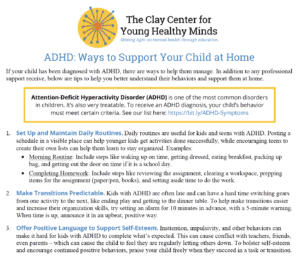Coping With ADHD: How A Young Man And His Mom Are Managing The Path To Success

Posted in: Podcast, Teenagers, Young Adults
Topics: Mental Illness + Psychiatric Disorders, Real Lives Real Stories
This blog post is part of a series entitled Real Lives, Real Stories: Personal Experiences With Mental Illness.
Note: The following person’s account of his/her personal experience has been published with his/her consent to support the mission of The Clay Center for Young Healthy Minds, and let others in similar situations not feel so alone.
Tune in wherever you get your podcasts – just search for “Shrinking It Down.”
Introduction (Gene)
We could have called this story “Conquering ADHD,” but that would have been a lie—more likely, too much of a fairy tale.
Most kids who have attention deficit hyperactivity disorder (ADHD) and problems with organization (otherwise known as “executive functioning”) live with it their whole lives. Like our personalities, strengths, weaknesses, and even illnesses or physical problems we develop, we find ways—hopefully healthy ways—to work and live with them. At times, we might laugh at ourselves as we trip or blunder. Hopefully we don’t scream or blame ourselves excessively, though this is very common and easy to do. If we persevere, though, we may just find a path to succeed like Peter did.
But, what is success in this world of inborn traits, genetic vulnerabilities, or wiring problems like ADHD? What does it look like? And, what can we write that will inspire hope (because there is hope!)?
Peter has an incredible story that he shares in the above podcast “Living With ADHD.” The unique feature to this podcast is that it includes Peter and his mom, Dr. Ellen Braaten, director of the Learning and Emotional Assessment Program (LEAP) at MGH, as well as Dr. Steve Schlozman, associate director of The Clay Center and Peter’s doctor.
In this post, Peter and Ellen will elaborate on what was discussed in the podcast, but from the angle of what it takes to grow and thrive despite this particular adversity. This is really the heart of resilience.
So, let’s hear from Peter and Ellen.
Peter, now 20, is tackling ADHD in his own way. As is the case for every psychological problem, we have to figure out what works for us individually. There are no magic bullets. No platitudes. No simplistic answers.
Not to be a spoiler, but I will be one anyway.
Peter is going to tell us:
- His need to understand and reflect on how ADHD affected him, which required nurturing self-reflection and awareness of his strengths and weaknesses.
- His struggle with the lack of understanding from those around him, especially adults.
- Why ADHD was tough on his self-esteem.
- His seeking out coaching rather than tutoring to set him on the right path with tasks.
- How he had to find the approach that worked for him.
- Some advice for parents.
Ellen will describe:
- Being a professional is useless with your own kids. No matter how much you know, at your core you are a mom like any other mom.
- You can’t make your kid do what you want, no matter how much you think you know what is best. You guide, and then try to let your kid find his own path.
- Fasten your seatbelt and enjoy the ride (well, not the fights, but the growth that will come with your faith and trust in your son).
So much for spoiling. Here’s what they can tell us.
Peter:
One of the most difficult things for me about being diagnosed with ADHD (especially at such an early age) was understanding it as a helpful push in the right direction. It was very hard for me to appreciate what a “diagnosis” meant. Does it just serve as a guide for treatment? Well, that might be fine for a doctor, but in my experience, it’s not a good guide for others. In some ways, it significantly influences the way others view you. Some understand what it means, while others don’t—some adults around me did not believe it existed or just seemed to disregard it.
Context is what I find difficult with this diagnosis. It is really something that affects every aspect of your life, which is why it’s so hard for other people (teachers, parents, etc.) to understand what it means for an individual to have ADHD. A diagnosis in itself does not inform others around you what tasks are easy or difficult. It does not differentiate effort levels. So for me, some activities have been pretty easy to accomplish, while others are very hard, if not impossible, without some kind of coaching. And, the amount of energy that it takes me to do different projects is highly variable. Only I know this though, so a teacher, parent, friend might not know what I’m going through—they’re not living my life.
We live in a world where results are everything. Too often I have been told to just “try harder.” Well, “trying hard” just doesn’t cut it anymore—it’s not so simple when you have ADHD, and especially if you have problems with organization in some tasks. I have gotten in trouble more times than days I’ve lived on this planet because I complete 85% of an assignment, task, or job. And then, when I just can’t do the rest, others around me get angry, frustrated, or simply don’t understand. And worse, I get really down on myself!
So what lowers my self-esteem?
A few of the most frustrating things to hear are: “Peter, you have the ability to do the work, why are you getting this grade?” or “Why aren’t the assignments coming in?” The worst is when a teacher has the perception that I’m not putting any effort into class or homework (usually because assignments are missing, or it’s hard to look like I’m paying attention in class).
But now, for the first time in my life, I’m gaining awareness about how I need to study; how much time I need in order to not answer a question impulsively; how I have to listen to music when writing papers (even silence is distracting to me); and how “later” doesn’t actually exist because procrastination manifests itself into my daily life.
What has really paid dividends to my academic success is something called academic coaching. The most important aspect of this coaching concept is accountability. There is someone whom I really like and respect expecting results from me (goals that I set for myself, not dictated to me by my parents), and I genuinely want to achieve those results and make myself proud.
I was never really quite OK with the concept of school, and it was not until withdrawing from college on the last possible day that I realized that everything is within my control. It may take me twice as long to get the same grade as someone else in a class, but that is just the price to pay for hard work and success.
Ellen:
Unfortunately, my knowledge as a child psychologist wasn’t all that helpful when it came to parenting a child with ADHD. I was just as frustrated as any other parent when I watched my son struggle with things that I thought should have been easier for him. There are no quick fixes for the problems that are part of an ADHD diagnosis; problems such as disorganization, slow speed of processing, poor attention, trouble sitting still and getting started on homework are hard to define, and each requires individualized treatment. That kind of treatment is hard to find—and rarely found within the public school system.
Many professionals still have misconceptions about the diagnosis—that it’s over-diagnosed, doesn’t exist, or can be overcome with willpower. But even knowing that it can’t be overcome without willpower…somehow….when you’re helping your 4th grader with his homework and he can’t even start, you think to yourself, Why can’t he just pick up the pencil and get it done?!
That kind of thinking isn’t helpful for anyone. If Peter could have picked up the pencil and gotten it done he would have. While this type of thinking is partly motivated by frustration, it’s also motivated by a desire to see your child succeed—by almost a wish that if you could say what he needs or should do, the behavior will magically happen. At the same time, yelling works to some extent. In fact, when Peter was in middle school, I remember saying to him, “Peter, we need to come up with a different way of helping you get your homework done other than my yelling at you every night,” and he said, “Well, yelling works!” Unfortunately, it doesn’t feel good for either party, and does nothing to teach the strategies that would actually help a child get the work done more efficiently the next time.
If I could go back and change some things about Peter’s life, I would have done a better job of finding a more appropriate match between his learning style and the school environment. We lived in a great suburban town with a well-ranked school system, but it wasn’t really a great environment for him. Ironically, helping kids find the right school environment is part of what I do! This just shows how hard it is to find the right kind of support. The current school culture talks about individual differences and learning styles, but I find that it’s the exceptional school that is able to put that into practice. Luckily, I feel Peter is finally in an academic setting where he is well-matched to his learning style and ready to take advantage of what is offered. That is also a key aspect to his success.
I’ve learned more from Peter about living with a disability than anything I’ve ever learned in a book, just as I learn from the families and kids I see every day. In many ways, Peter is far more knowledgeable about himself than other kids his age who have had a smoother ride. I’ve observed this in the kids I’ve worked with over the years—kids who successfully negotiate life while dealing with disabilities are better able to handle the inevitable bumps in the road than kids who haven’t had to.
Thus, my advice to parents is to enjoy the ride, wherever it takes you, and to be open to the possibility that the child who struggles most may also be the one who has the most to teach you—and the one who may eventually surprise you in ways you never expected.
Peter:
I’m currently taking classes at a community college and getting straight A’s. I hope to raise my GPA and transfer back to a four-year institution. Looking to the future, I hope to continue to develop academic confidence, as well as spiritual fulfillment.
My final advice to parents is to have patience, to truly listen to what your kid needs, and to not press your own agenda, as hard as it may be. We all work at our own pace and develop at our own rate.
Summary (Gene):
Living with ADHD is no fun for the kid or the parent. What we’ve seen here is that Peter and Ellen’s success came from understanding how ADHD was affecting Peter individually, therein finding ways to cope with it that were effective for him. Not everything works for everyone.
Both Peter and Ellen reveal not only that it’s possible for one to cope with ADHD, but also that, as painful and difficult as it has been for each of them, sometimes one needs to face adversity in order to become stronger.
We all have our rough spots—our vulnerabilities. But facing them directly and honestly only makes us stronger.
A version of this post originally appeared and was written by the authors (Beresin, E. Braaten and P. Braaten) on WBUR’s CommonHealth.


 Share
Share Tweet
Tweet






